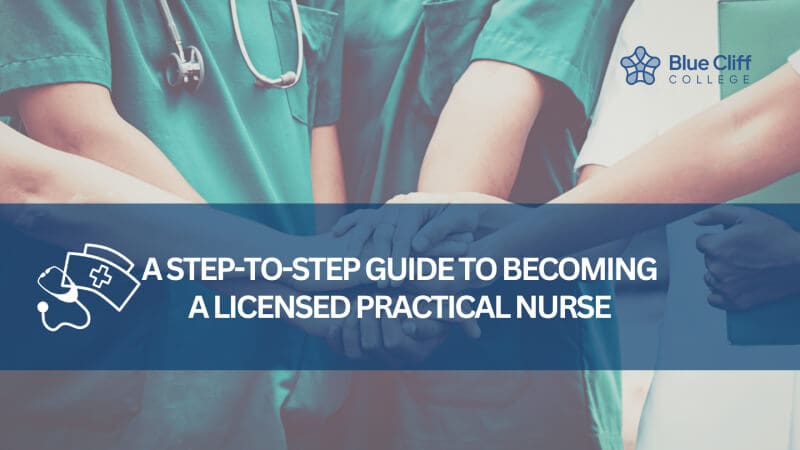Have you considered a career in healthcare? If so, there are many options inside and outside the examination room. Working in medical administrative functions rather than with patients in medical billing and coding is one such option.
It’s a challenging yet rewarding career for those that are detail-oriented with an aptitude for numbers and data. There are great opportunities for medical billers and coders, so read on about the field and how you can join with a Medical Billing & Coding online diploma from Blue Cliff College.
Take the first step in your career journey today!
What is Medical Billing & Coding?
Medical billing and coding are locating diagnoses, medical examinations, treatments, and procedures recorded in clinical documentation and then transcribing patient information into standardized codes to charge the government and private payers for physician compensation.
The medical reimbursement cycle involves both the medical billing and medical coding professions, which cooperate to ensure that healthcare professionals are effectively and appropriately compensated for their services.
Medical offices must invest in highly qualified medical billers due to the rising demands on healthcare professionals and allied health physicians and the declining reimbursement rates. Medical billers are tasked to maximize revenue performance through the claims and appeals process. The efficiency of the billing office can have a direct correlation between a practice and its bottom line.
What Are the Career Paths for a Medical Billing & Coding Graduate?
A variety of distinct job titles may be associated with careers in the field of medical billing and coding. Depending on the duties of the given role, they may change. Some of the job options in medical billing and coding include¹:
- Medical Records Coordinator
- Coder
- Medical Coding Specialist
- Medical Billing Specialist
- Medical Records Technician (or Medical Records Tech)
- Health Information Specialist
- Medical Records Clerk
- Health Information Clerk
- Medical Records Analyst
- Health Information Technician (or Health Information Tech)
- Medical Billing Manager
- Medical Records Director
Depending on the employer or area, several occupations may have the same general work duties but distinct titles. Careers at the management level in this industry can call for further training or job experience.
What Are the Job Duties of a Medical Billing & Coding Graduate?
A medical coder’s primary responsibility is to review clinical data to identify billable procedural codes and convert them into classification schemes for invoicing. The process of converting medical reports into codes used by the healthcare sector is known as medical categorization, sometimes known as medical coding. Medical codes are used to condense medical services and to report. This medical code set supports medical coders in describing the healthcare procedures used to treat patients’ conditions and documenting their conditions.
Medical billers submit claims to health insurance providers and then follow up to get paid for the services provided by a healthcare practitioner. They’re able to read medical records and be conversant with codes. Medical service is converted into a medical billing claim through medical billing. The medical biller must follow the claim and ensure the practice is properly compensated.
What Are the Work Conditions / Environment of a Medical Billing and Coding Graduate?
Medical billing and coding professionals arrange health information and ensure that everyone at the healthcare center can access it. Although some organizations sometimes keep paper files, dealing with electronic data is the norm for this role. Medical billing and coding professionals should feel comfortable utilizing computers because much of the work is done on them.
The healthcare system’s emerging and crucial component is medical billing and coding. Most of the field focuses on paying medical professionals for the services they deliver. Physicians and other care providers would not get reimbursed for their services without medical billers and coders. Medical facilities could not operate efficiently as a result.
Medical billers and coders are often in charge of evaluating patient records, compiling patient information, and putting it into a field-recognized classification system. These codes can then be utilized for billing, patient treatment, and public health data by insurance companies, healthcare professionals, and health researchers. Some of the places where a medical billing & coding professional work include²:
- Billing Companies
- Consulting Firms
- Hospitals/Clinics
- Insurance Companies
- Large Medical Groups
- Resident Care
- Software Companies
- State and Federal Government Agencies
Despite not directly caring for patients, medical billers and coders frequently collaborate with doctors and registered nurses to comprehend patient data. Additionally, they communicate with insurance companies to request and monitor payments, as well as with government organizations to assist in the data collection process. They are able to find employment in a number of venues because their job touches on numerous facets of the healthcare industry.
How Long is Medical Billing & Coding School?
A great example of the length of medical billing and coding school is the Health Information Management, Billing and Coding (HIMBC) Program at Blue Cliff College prepares students for entry-level positions in medical insurance, billing and coding, as well as in medical office administration. Program completion times for each HIMBC Program are³:
- HIMBC Diploma Campus Day (65 Credit Hours) 12 months
- HIMBC Diploma Campus Night (65 Credit Hours) 15 months
- HIMBC Diploma Online (65 Credit Hours) 15 months
- HIMBC Degree Online (99 Quarter Credit Hours) 7.5 – 9 months
Students who have completed the online HIMBC Diploma Program with Capstone may transfer in 65 credit hours and are not required to repeat the Capstone as they complete their online HIMBC Degree. The normal completion time is 7.5 months.
Students who have completed the on-campus HIMBC Diploma Program without the Capstone may transfer in 59 credit hours and will be required to take the Capstone as they complete their online HIMBC Degree. The normal completion time is 9 months.
What’s Next to Get Your Medical Billing & Coding Online Diploma
Medical billing and coding may be a great choice if you enjoy working with numbers, are detail-oriented, and want to work in the medical industry behind the scenes. You can perform a wide range of tasks within this line of work, and there are numerous settings in which you can work.
It starts with a Diploma in Health Information Management, Billing, and Coding from Blue Cliff College. You’ll learn about the technical skills, software applications, and basic operations of medical office administration to keep medical offices running smoothly and efficiently.
The HIMBC program at Blue Cliff College prepares graduates for entry-level positions in the healthcare field as a coding specialist, insurance claims specialist/representative, front desk/receptionist, and billing and collections. Contact us to start your new career today!
Learn more about Medical Billing & Coding Online Diploma at Blue Cliff College!
Sources:
- https://www.ultimatemedical.edu/blog/how-to-start-career-in-medical-billing-and-coding/
- https://www.goodwin.edu/enews/where-do-medical-billers-and-coders-work/#:~:text=Hospitals%20and%20Clinical%20Practices,bills%20and%20insurance%20claims%20accordingly.
- https://www.bluecliffcollege.edu/program/himbc/
Brian Maggio is the Vice President of Admissions and Marketing at Blue Cliff College, a leading provider of career training programs in the healthcare and beauty industries. With years of experience in the education and training industry, Brian has trained individuals nationwide in soft skills, sales, leadership, and training.





